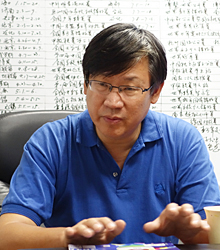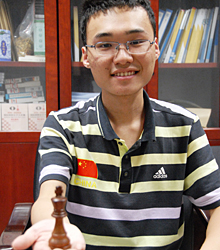|
 |
 |
|
Ye Jiangchuan (WEI YAO) |
Yu Yangyi (WEI YAO) |
Compared to most of his peers, 20-year-old Yu Yangyi leads a distinctly different life. Seven to eight hours of his day, every day, are spent playing, practicing and thinking chess.
His efforts have finally paid off.
This year, his team won first place at the 41st Chess Olympiad—held in the Norwegian city of Tromsø in August—together with his four teammates Ni Hua, Wang Yue, Ding Liren and Wei Yi.
This marks the first time the Chinese men's chess team has won gold at the event since its inception in 1927. In the last round of the competition, the Chinese team beat Hungary, finally conquering the event with eight wins and three draws. Up till now, the winners of the Olympiad have all hailed from European countries and the United States.
The Chinese men's chess team has made national history, stunning the world after Xie Jun's 1991 win at the Women's World Chess Championship propelled her to become China's first women's chess world champion, and the Chinese women's chess team took their first ever first-place win at the 1998 Chess Olympiad.
In China, the men's chess team has long been outshined by the glory of the women's team. Having already brought home four Chess Olympiad grand titles, respectively in 1998, 2000, 2002 and 2004, the team has also produced four world champions: Xie Jun, Zhu Chen, Xu Yuhua and the current champion, Hou Yifan. The Chinese women's team won second place at this year's Chess Olympiad.
While they have come close to taking the title several times, the men's team has narrowly missed these opportunities and remained in second place at three World Chess Championships and one Chess Olympiad.
"We won the Olympiad this time because we were confident and embraced teamwork," said Yu. "Most importantly, we were self-disciplined and observed a regular schedule."
Yu said it's important for chess players to follow a strict daily routine as staying up late or having an irregular diet might affect their performances.
A competitive chess game usually lasts three to four hours—sometimes stretching from seven to eight hours when a game is too close to call—thus requiring players to maintain a strong mental poise and concentrate intensely on the game. Some have even compared the amount of energy exerted during a round of chess to that of a boxing match.
"Some players may have been tired of the cafeteria food there, which was the same every day, and chose to dine elsewhere. However, I stuck to the same foods throughout the competition, which kept me healthy and helped me win," Yu said.
Thanks to his self-discipline, Yu gave an outstanding performance during this year's Olympiad and was awarded the Best Individual Player on the men's side.
Ye Jiangchuan, head coach of the Chinese chess team, was not surprised by the success of the team this time around.
"We have taken a number of approaches to strengthening the men's team in recent years, including encouraging them to take part in all kinds of international and national matches and build up their spirit of teamwork," said Ye. "Additionally, many players are enrolled in university. Such learning experiences help to improve their overall competence and chess-playing abilities."
The average age on the Chinese men's chess team is very young, at just 22 years old, with the oldest player, Ni Hua, being 31, and the youngest, Wei Yi, just 15.
"Having started to play chess at an early age, they have accumulated vast experience in a short time," said Ye. "Our next goal is to train a men's world champion."
| 